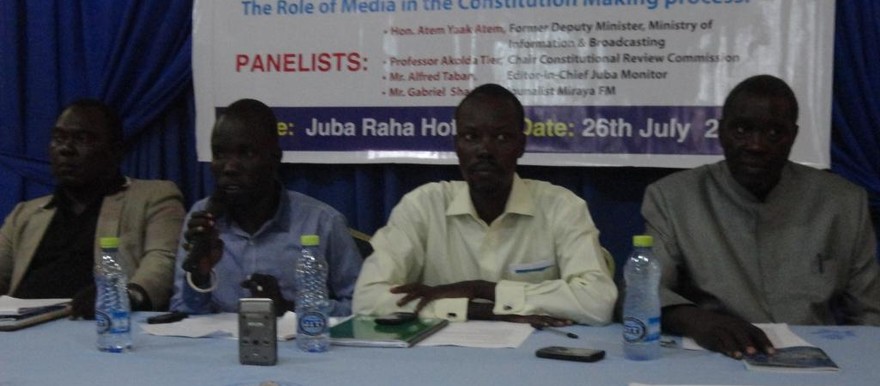The South Sudan Constitutional Review Commission and the Institute for the Development of Civil Society on Friday held a forum in the national capital where they called on media to educate citizens about the constitution and the constitutional review process. A senior journalist at the event spoke about some challenges.
The Institute for the Development of Civil Society organized the event under the theme ‘The role of media in the constitution-making process.”
Speaking at the forum at Juba Raha Hotel, Akolda Ma’an Tier, the chairman of the commission, told a select audience that the commission was doing its best and in turn is asking the media to assist in creating awareness among South Sudanese.
“Your role in the constitutional review is very important. I mean media reaches not only to those who can afford to attend meetings but even to those who remain at home,” he remarked. “When we go out our mandate is to explain what is in the constitution.
For his part, Alfred Taban, editor-in-chief of the Juba Monitor newspaper, concurred with Professor Akolda’s call for media to take a role in educating the people about the constitutional review, but also swiftly criticized the commission for doing little and blamed the government for continuously putting unnecessary restrictions that hinder the performance of the media.
“The work of the media is clear. It is to educate, inform and entertain the public. So it is prepared to do all these things,” said Taban. “But the government, the media and the Constitutional Review Commission appear not to be doing their work very well. Because a survey that was conducted by the International Republican Institute which was released this month said that 59% of South Sudanese have not heard about the constitution.”
“That means 6 out of 10 South Sudanese know nothing about the constitution. How can it be like that? How can so many South Sudanese be ignorant about the constitution if we are doing our work?” Taban queried.
He said part of the reason why so many people are ignorant about the constitution is because the media are using foreign languages, namely English and Arabic, to disseminate the information to the population instead of local languages such as Dinka, Bari and Shilluk, which are known to them.
Taban cited also recent intimidation of the media by the government security personnel in various parts of the country. He recalled the events at Good News Radio which was recently disturbed by security personnel in Lakes State and arbitrary arrests of journalists in the country, himself included. He called on the government to stop that immediately and encouraged journalist to do their work. Nevertheless, the editor-in-chief also praised the government for passing the media bills.
“We are waiting for the president to sign them into law,” he said of the media bills. “When it is passed we then hope that the mindset of the government officials particularly the people with the security will change, then they will deal with the media in a friendly manner, unlike now,” he said.
“I hope then things will change a bit – but now the situation is not good, the media is not being allowed to play its role of informing and educating people,” he remarked.
Among the other panelists was Radio Miraya presenter Gabriel Joseph Shadar, who shared similar views. “We need to make journalists aware about the constitution. We need to conduct workshops on what are the contentious issues in the country,” said Shadar.
On the side of the participants, some journalists complained about not being able to conduct their activities due to restrictions from the government and financial constraints. The people who attended were few in number, although many people had been invited.




